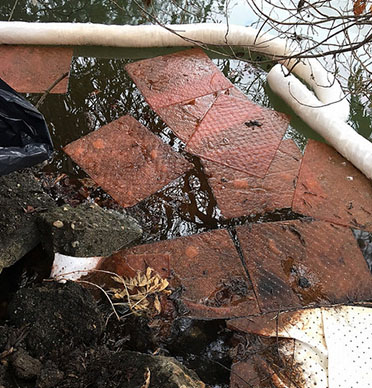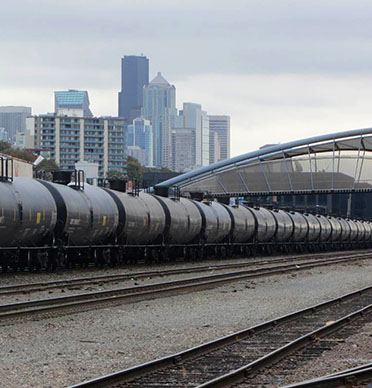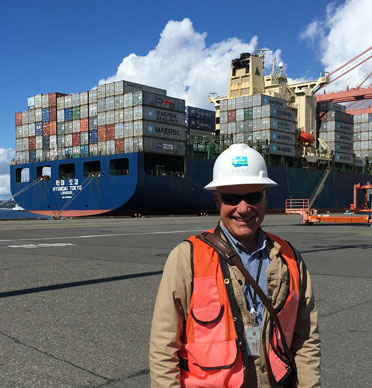Oil spill prevention in Washington
It is far less expensive to prevent an oil spill than it is to clean one up. No spill is acceptable — once oil is released into the environment, harmful consequences have already occurred. All oil spills are toxic and pose a significant risk to Washington’s environment, economy, public health, and historical and cultural resources.
We work with the regulated community and others to minimize the environmental threat of oil spills from vessels, railroads, pipelines, and oil handling facilities by focusing on human procedural and organizational factors. In delivering these services, we play a key role in minimizing the long-term release of toxics into the environment and helps to protect the waters, soil, air, and public health of the state.
When a spill happens, we deploy a rapid, aggressive, effective, and well-coordinated response.
The cost of a spill
A significant oil spill could cost the state an average of $10.8 billion (based on 2006 estimates) and adversely affect 165,000 jobs. It would disrupt maritime shipping, port activities, recreation, and tourism, and cause significant harm to fish, shellfish, and wildlife resources.
More than 20 billion gallons of oil is transported through Washington state each year by vessel, pipeline, and rail. Washington is home to ports that handle significant international and domestic shipping trade, and Washington is a major oil refining state. Oil is constantly moving in, around, and out of Washington. Washington invests heavily in spill prevention and preparedness because the consequences of an oil spill are extremely high. Oil spills can halt commerce and cause severe economic consequences.
Washington has a lot at stake. It's got some of the world’s most special and unique marine environments, which are sources for beauty, recreation, food supply, and economic livelihood. Washington has rich stocks of salmon and shellfish.
Washington also has one of the lowest oil spill rates in the nation because we have such a strong safety prevention net — one of the most comprehensive spill prevention, preparedness, and response programs in the nation and world.
Why spills happen
Understanding the causes of spills and incidents is important for preventing them. Most vessel incidents are caused by human and organizational factors.
Learn more about the causes of spills
Oil transportation is changing in Washington
Historically, 90 percent of crude oil for refining was imported to Washington by vessel and pipeline. New technologies in oil fields in Canada, North Dakota, Montana, and other states mean the U.S. now produces the majority of its own refined oil products.In 2012, the increase in U.S. oil production strained the capacity of existing oil pipeline infrastructure and caused a sudden shift in the supply chain to transporting oil by rail. In the 2015-17 biennium, the Washington Legislature passed the Oil Transportation Safety Act to protect Washingtonians from the new risks posed by oil trains. Under it, we have:
- Expanded oil spill response planning to cover sensitive areas near railroad lines
- Conducted risk evaluations of Puget Sound and the Columbia River and started work on Washington Rail Traffic and Grays Harbor Vessel Traffic evaluations
- Continued to build out our oil spill response equipment cache grant program
- Started developing oil spill contingency plans for railroads that operation in Washington
Oil transportation
Washington is a primary West Coast port to international shipping trade and a major refining state. Oil is constantly moving in, around, and out of Washington. We invest heavily in spill prevention and preparedness because the consequences of an oil spill are extremely high.
Learn more about oil transportation in Washington
Spill prevention is the heart of what we do
Washington has one of the lowest spill rates in the nation and one of the most comprehensive spill prevention, preparedness, and response programs in the nation and world. Our drill program has become a teaching ground for other countries and states. We have good reasons to be vigilant.- We have five crude oil refineries and one biorefinery in Grays Harbor
- Our shoreline is 2,700 miles long — longer than the coastlines of Oregon and California combined
- Approximately 5,000 vessels transit move in, out and within our waters annually
- We have over 21,000 miles of natural gas and hazardous material pipelines
- And there are over 3,100 miles of railroad tracks – all of which could be oil bearing tracks
Preventing spills
We invest heavily in spill prevention and preparedness because the consequences of an oil spill are extremely high. Besides environmental harm, oil spills can halt commerce and cause severe economic consequences.
Learn more about our oil spill prevention work
Related links
Contact information
Jasmin Adams
Spills Program Acting Communications Manager
jasmin.adams@ecy.wa.gov
360-464-0324




